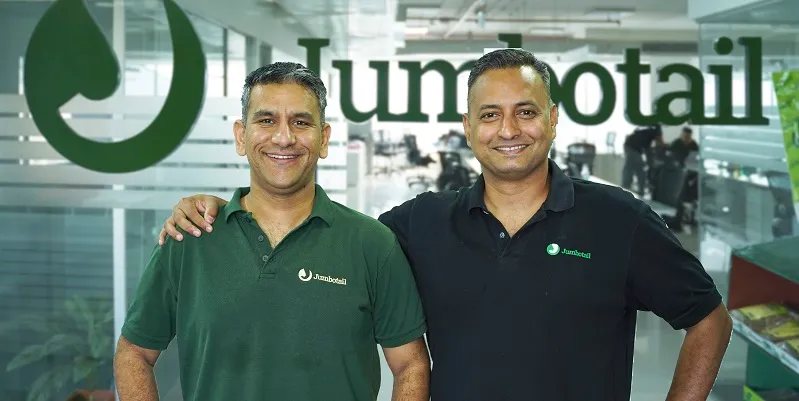[WATCH] Online marketplace Jumbotail’s unlikely hero in coronavirus fight: the kirana
Ashish Jhina, Co-founder of wholesale online marketplace Jumbotail,reveals how coronavirus and the lockdown have affected the supply chain, how it is working with kiranas to resolve operational complexities, and why small stores will emerge stronger.
Despite the proliferation of big FMCG brands and swanky supermarkets, the humble kirana continues to hold sway in India.
A whopping 90 percent of India's $700 billion retail market is unorganised, and mostly made up of neighbourhood kiranas that have for years offered consummate consistency and efficiency.
Eyeing an opportunity to organise this unorganisedmarket, Ashish Jhina and S Karthik Venkateswaran in 2015 founded , a wholesale online marketplace for kiranas. Since then, the Bengaluru-based startup has tied up with over 25,000 kiranas and has raised $23.2 million in funding.

Founders Ashish Jhina and S Karthik Venkateswaran started Jumbotail in 2015. It has tied up with over 20,000 kirana stores in Bengaluru since then.
Ashish, a third-generation apple farmer, was a high-level consultant for corporates and had a good understanding of the CPG industry before starting up. The IIT-Delhi and Stanford alumnus aims to bring a method to the madness of the archaic supply chain that works with kiranas.
His startup, which is digitising the kirana with its wholesale online marketplace, provides full-stack services for kirana stores, including storefront delivery and payments collection for its sellers. It also has a fintech platform that provides payment solutions and access to working capital credit from its lending partners to customers.
In the time of coronavirus, demand for essentials has spiked and the broken supply chain is leading to problems – for sellers and buyers. The co-founder of Jumbotail sees the pandemic as an “opportune moment” for kirana entrepreneurs to order online. But will they?
In an interview with YourStory, Ashish reveals how the spread of COVID-19 and the subsequent lockdown have affected the supply chain, how the online marketplace is working with kiranas to resolve operational complexities, and why the future of the mom-and-pop store is digital.
Edited excerpts of the interview:
YourStory: How are you working with kiranas during the coronavirus pandemic?
Ashish Jhina: There has been chaos since the lockdown. We serve 25,000 kiranas in Hyderabad and Bengaluru. The first few days saw supply constraints because of labour issues. But, we have been operational every single day, and have worked with brands to supply on time.
Capacities have rebounded very quickly as demands have spiked. This is natural because of the lockdown. There is a fair amount of operational complexity because you have to ensure supplies to as many stores as possible in less than 48 hours.
An average kirana sells Rs 5 lakh worth of items per month ; 55 percent of the items sold are staples and there is no formal distribution. To get staples, owners have to either close the store or leave it with someone. They usually stock for 15 to 20 days, and lock their working capital. FMCG products are bought from distributors. That’s roughly how the supply chain works.
For the last four years, we have realised that this has to change because they need help with managing their space (they stock close to 150 items) and don’t know how to move these items fast. The time taken to manage the store and supply is crucial.
Kiranas handle several brands, national and local, and are in need of credit. There needs to be a solution for the demand-and-supply side, and there needs to be pricing transparency without any intermediaries.
That’s where Jumbotail has been helping kiranas. We are an ecommerce market place where kiranas use an app to order essentials. We are available in four languages; it is a 100 percent digital play and there is no assisted buying here. All users go online and order. There is no salesforce from our side.
During the COVID-19 pandemic, kiranas are using our app to order products 24x7. On the brands side, we work with 20 top brands. We also have our own private labels in staples and deliver over 3,500 stock keeping units.
We manage the supply chain ourselves. It is critical because we prioritise service levels to customers; that is our competitive edge. As many as 85 percent of our customers order more than 10 times a month. They get their supplies in one consolidated lot in 48 hours. This is very important during the lockdown as the third-party supply chain has failed and cannot keep capacities high, which is why we have done well.
YS: Why do you think the future of kiranas is digital?
AJ: Brands are already going digital and now that the economics of physical distribution with feet on street will not perform well in the long run. I am a third-generation apple farmer, but am not in farming because it is not lucrative anymore. It’s the same thing with distribution. The current generation does not want to be in distribution because it still operates in the traditional way.
Any industry that relied on man power is losing its edge, and the service is unreliable. So, traditional FMCG distribution businesses have to go digital.
Kiranas will come out of the COVID-19 crisis stronger. Unfortunately, they have a very bad share of mind and wallet. Kiranas still stock 95 percent of the countries food and grocery, but their share of mind in the media is very low - big brands are represented better there.These stores do not have one consolidated voice. However, the vast majority still goes to kiranas during the pandemic.
Going forward, kiranas will use tech to source and sell to consumers. As of now, 35 percent of kiranasales come from home deliveries. They will definitely use hyper local platforms to reach consumers. That’s why we are giving them our J24 platform where they have branding and a POS system, to manage customers.
Hundreds of apartment complexes have reached out to us to set up kiranas in their premises. We are going to help kirana store entrepreneurs set up these stores by powering them with technology. As recently as last week, we created a kirana in a large apartment complex in a matter days.
We are trying to scale up this model; it brings a significantly higher service level. These stores in apartments are intelligent; they help people know what is in store; and they are informed about the number of people in the store. They can help apartment complexes maintain social distancing.
Every kirana wants more sales and manage this with better inventory. There is no dead stock – that’s where our technology is helping them. We increase the area that the kirana store serves, from 400 metres to 5 km, and can connect them with partner hyper local platforms.
YS: What is your business model and do you offer credit to kiranas during the pandemic?
AJ: We are an ecommerce company and charge commissions from the marketplace and shipping fees. We have an ecosystem play in mind and work with partners wherever possible.
When you look at requirements for payments for merchants, they are very different from consumers. The merchant may use cash, debit card, credit card, or UPI for a larger order value. S/he could use four or five instruments for one transaction. They also take credit from our partners. It provides flexibility.
The idea behind credit is to tide over differences in cash flows. You order something today, expecting it to sell in 20 days and so forth. That’s when you need credit. But our supply chain is different; we are available at all times, including this pandemic.
A kirana does not have to hold stock for a week or more; the cycle can be brought down to less than a week. However, we still offer credit to kiranas with our partners and have metrics to measure intent and ability of return, thanks to the digital chain that offers PoS and app data. We have 99 percent repayment rates, and most of the money is used to buy more products. We have provided a large credit line to our partners.
As a country, we are extremely entrepreneurial. And I believe kiranas are resilient. They want to serve well and are keen to give their families a better life with the money they make. A huge 80 percent of all orders in India are less than Rs 200 per day – these can be serviced by kiranas.
(Edited by Teja Lele Desai)


![[WATCH] Online marketplace Jumbotail’s unlikely hero in coronavirus fight: the kirana](https://images.yourstory.com/cs/2/79900dd0-d913-11e8-a160-45a90309d734/Jumbotail_founders1563889490084.jpg?mode=crop&crop=faces&ar=16%3A9&format=auto&w=1920&q=75)





